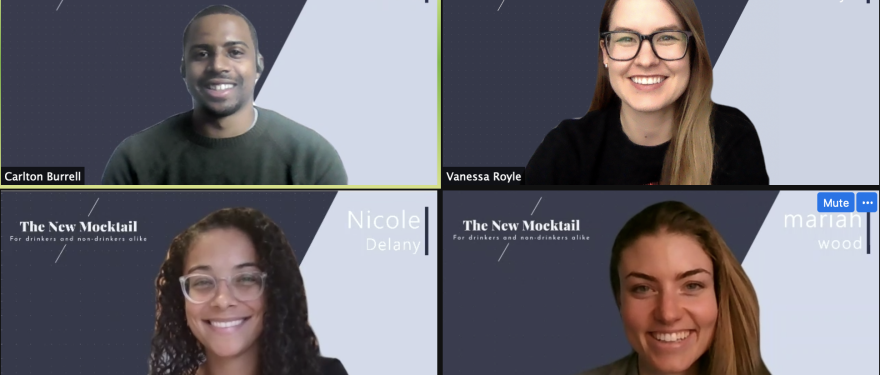When I started at HBS in the fall of 2020, I had one goal in mind: to challenge myself. I previously worked in communications at Cloudflare, a security, performance and reliability company founded in 2009 by two HBS alumni. Cloudflare had started as an idea on the back of a napkin during a school trip, so I knew that HBS was a place where entrepreneurship thrived.
With this in mind, I decided to jump at the opportunity to join Startup Bootcamp, a two-week Short Intensive Program (SIP) or class that takes place between the first and second term. It offers a learn-by-doing approach to help students build the skills required of an early-stage entrepreneur. You can participate as a “joiner” or a “founder.” I had initially planned to participate as a joiner and see where my skill set was most needed, but when the idea for a zero-proof cocktail popped into my head one night while I sipped a boring sparkling water, I chose to challenge myself and instead recruit a team to work on my idea. I ended up working with Mariah Wood, Nicole Delany and Carlton Burrell, fellow classmates who were equally passionate about the idea of creating a sophisticated offering that drinkers and non-drinkers alike could enjoy in any social setting.
With my dream team in place, we were able to develop a compelling product, vision and go-to-market strategy. More importantly, I learned a few key things that I will take with me:
Your solution might not fit the problem.
I had a pretty clear idea of what I wanted to create going into Bootcamp. Our advisors, however, really pushed us to dive deep into customer discovery, surveys and experiments to truly understand the problem we were trying to solve. In talking with potential customers and conducting hours upon hours of interviews, we realized that there were pain points that our initial idea wouldn’t necessarily solve. Taking a step back and erasing biases around our idea allowed us to better understand the true value we would be creating and helped us to determine who our target customer would be. It seems my team was not alone. Many teams seemed to return back to the drawing board, and I think we’re all better for it.
A good team is everything.
I was admittedly a bit nervous going into Bootcamp. I was worried about it turning into a group project horror story like those I’d experienced in undergrad. Instead, my team was engaged, passionate and extremely invested in the idea. I was so thankful to have a team that backed my initial idea and ran with it. Additionally, my team was a great combination of skill sets and backgrounds. I made a point to recruit outside of my section because I wanted to meet more people from HBS. The result was that we all came into the class with no prior experience together and were able to build a relationship around the experience and our venture. The strength of our team showed. By the end of the two weeks, we were gelling really well and our mock investors noted that it seemed like we’d worked together before!
Having a personal connection to your idea really helps.
We were told many times throughout Bootcamp that passion around your idea is key. It wasn’t until the end of the two weeks that I realized how true that is. When they call Startup Bootcamp an “intensive” program, they mean it. There were days that we worked from 9 to 5 on zoom and then logged on again in the evening to work on our website, survey or final pitch deck. This may be normal for a budding startup, but for a school program, it seemed like a lot. I was exhausted, but I wanted to keep going. This passion drove our team and without it, I don’t know how we could’ve gotten through the two weeks still smiling. I also learned that passion really helps when you start pitching. Investors love the financials and market opportunity but especially at an early stage, they’re investing in YOU. VCs can tell if you are connected to your product, and having a personal origin story is a huge differentiator.
I’d urge anyone even curious about entrepreneurship, or just looking for something to do in January, to pursue Startup Bootcamp. Beyond the business skills, I made great new friends, met a slew of awesome advisors and proved to myself that I could make something out of the tiny seed of an idea.

